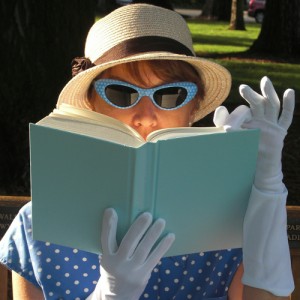
McNair Wilson, Disney Imagineer and creative consultant to notables such as Apple, Universal Studios and Sony Entertainment, says: “Let’s guess that you are not a cupboard for the storage of God’s ideas. If that’s true, let’s open that cupboard, get that stuff out and start using it. Life is going to be scary and hard and challenging no matter what we do. Why not do you. If you don’t do you, you doesn’t get done, and the world is incomplete. So start chipping in and completing the world.”
As a writer, I churn out material on the page, and that’s my baby. My creation. If I send a short story off to a publisher and it gets rejected, that hurts. But guess what. Whoever rejected it is only one person. One guy. It might be someone who ate pizza for lunch and had heartburn when reading my piece. It might be someone who read 50 manuscripts before mine, and felt burned out. It might be someone…we just don’t know. So it comes back. Sorry, not a good fit for us. Good luck!
It might be just that: not a good fit.
I send it off to someone else. It’s rejected again. That’s just another guy. Or gal. It’s not the whole publishing house of 100 or however many people work there, it’s not the 5 who work at the literary magazine. It’s one person.
Maybe one of those someones gives feedback. Suggestions on how to revise the story to make it stronger. That’s good! Embrace the feedback. It’s how we become better writers.
Rejection is part of the game. You’ve heard it before: the more “no’s” you get, the closer you are to “yes.” It’s the law of averages. It’s gravity. Whatever. The point is, I can’t let rejection doubt my voice as a writer. I can’t make it extinguish me.
It’s tempting to want to write like the authors I admire. I’d love to be as literary as Louise Erdrich, as uplifting and breezy as Alexandra Franzen, as homey and wise as Robert Fulghum, as funny as David Sedaris, as concise as Raymond Carver (and Chandler), as free-flowing as Jack Kerouac, as imaginative as Ray Bradbury, as poetic as…well, you get the picture.
As babies, we learn to talk by modeling the movement of our mother’s lips and tongue, or the lips and tongue of whatever face is bending over our cribs. We see how Mom presses her lips together to say the letter “m,” how Dad touches the tip of his tongue to the back of his upper teeth to say “No.” We model the dialect, rhythms, and word choices that surround us.
I learned to write by modeling great writers. I learned how to play with language, set up story, pare down dialogue, master point of view. I copied lines word for word to get the feel of words in my body. I took it all in like a sponge.
But there came a point when I needed to wring out that sponge so I was left with what makes me, me. Like the DNA from my parents that formed the blue-green of my eyes and the curve of my arms, like the genes that scrambled together to make the unique stride, temperament and laughter that makes up me, my writer’s voice is a DNA-pool of all the writers I’ve studied, all the books I’ve read, all the teachers I’ve followed. Nobody else can do me.
Novelist and teacher James N. Frey, who wrote How to Write a Damn Good Novel, says: “The number of books that became hits after being rejected is enormous. The reason is, really good work is different, and different means risk to an editor. Having an attitude as a writer means you have to take risks, which means you’ll scare the hell out of some editors and you’ll have to suffer rejection as a result.”
Attitude means we don’t quit. Attitude means we don’t make excuses for not doing our art. Attitude means when we get hit, we hit back. We send that story out again. And again. And again.
When rejection comes, I need to remind myself: there are billions of people in this world. My writing will touch more than that one guy judging that one contest. My stories will resonate with more than that one gal at that one journal. When anxiety or depression set in because I’m discouraged and avoiding my art, I need to get back in the writing saddle and let my voice run free. I need to be persistent, continue to develop my craft, keep my head down and write, write, write with attitude.
I need to open that cupboard, chip in, and complete the world.


